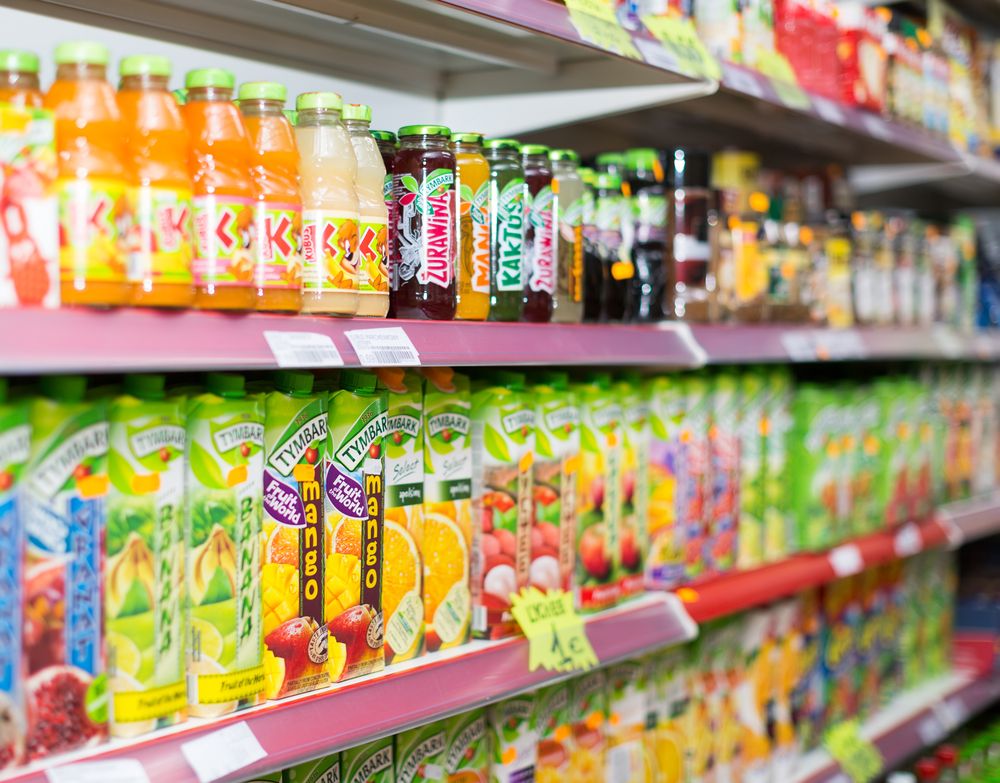In theory, juice should be a nutritious beverage since it's derived from fruit, right? Even dietary guidelines classify a cup of 100% fruit juice as a serving of fruit. However, regrettably, not all juice brands are on the same page, and some can have more adverse effects on our health than we might anticipate.
This discrepancy arises because numerous bottled juices found on supermarket shelves often contain minimal real fruit content, virtually no fiber, and an excessive amount of added sugar. To highlight the less favorable options, we consulted with registered dietitian experts to create a list of juice brands that lack nutritional value and may not contribute to overall health.
From sugary concoctions to deceptive health claims, get ready to identify which juice brands you might want to avoid if you're aiming for a healthier lifestyle.
What's the True Health Status of Fruit Juice?
Your intuition that fruit juice carries health benefits is accurate! Specifically, 100% fruit juices can serve as valuable sources of essential vitamins and minerals, such as vitamin C and potassium, while also offering a dose of antioxidants. Furthermore, juice can be a convenient means of fruit consumption, particularly when fresh fruit is unavailable or incorporating fruit into every meal proves challenging.
Nevertheless, the primary drawback of fruit juice lies in its high sugar content. If you're not consuming 100% juice, your drink likely contains added sugars as well. Research demonstrates that sugar-sweetened beverages, including certain less healthy juice drinks, constitute the largest single source of calories and added sugar in the U.S. diet. These beverages don't promote satiety and offer limited nutritional value.
It's vital to exercise moderation when consuming fruit juice and adhere to recommended portion sizes, which equate to one cup or eight ounces. The USDA recommends that "at least half of the recommended fruit intake should consist of whole fruit rather than 100% fruit juice." This is because whole fruit provides valuable nutrients like fiber, which is absent in the juiced version.
What Factors Make Juice from the Store Less Nutritious?
Experts suggest these criteria for identifying less nutritionally beneficial juice brands:
- Absence of "100% fruit juice" label: A label stating "100% fruit juice" indicates no additional sugar during processing. In a healthy juice, the primary ingredient should be the fruit juice itself, and if added sugar appears among the first three ingredients, it likely contains a substantial amount.
- Excessive sugar content—both added and natural: In general, the more added sugar a juice contains, the less healthy it is. However, it's crucial to limit the overall sugar content in the juice, even if it originates from the fruit. While it's common knowledge to restrict or avoid added sugars, it's also advisable to keep your total sugar intake at or below 12 grams to manage blood sugar effectively.
- Low to negligible vitamin content: Juice should always contain vitamins; otherwise, they are likely made with minimal real fruit content, as noted by Jesse Feder, MS, RDN, a personal trainer and registered dietitian. To optimize the nutritional value of your juice, consider options fortified with nutrients like added fiber to support digestive health.
Now that you're equipped with guidelines to identify genuinely nutritious fruit juice, discover which juice brands may masquerade as healthy but are nutritionally lacking, according to dietitians. Learn which juice brands to avoid as nutritionists reveal the unhealthiest options available in stores.
1) Simply Fruit Punch
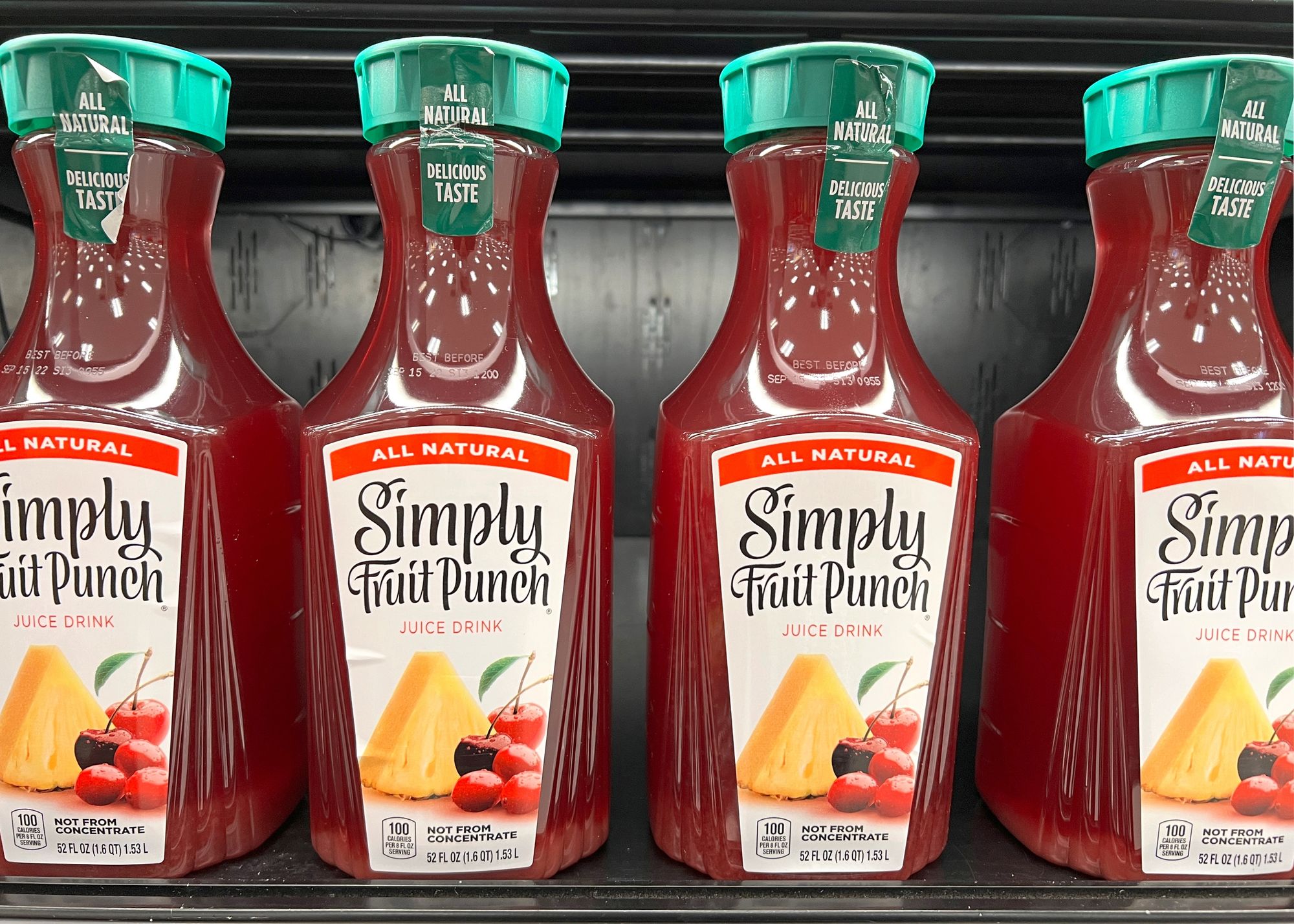
PER 8 FL OZ: 100 calories, 0 g fat, 15 mg sodium, 25 g carbs (0 g fiber, 25 g sugar), 0 g protein
Dietitians unanimously recommend avoiding fruit punches in general. They tend to be laden with sugar and contain minimal actual fruit juice.
Consider Simply Fruit Punch as an example. Its name can be somewhat misleading, as fruit ranks third in the ingredient list, following water and sugar. In fact, 21 out of the total 25 grams of sugar in this beverage consist of added sugars.
2) Bolthouse Farms' Green Goodess
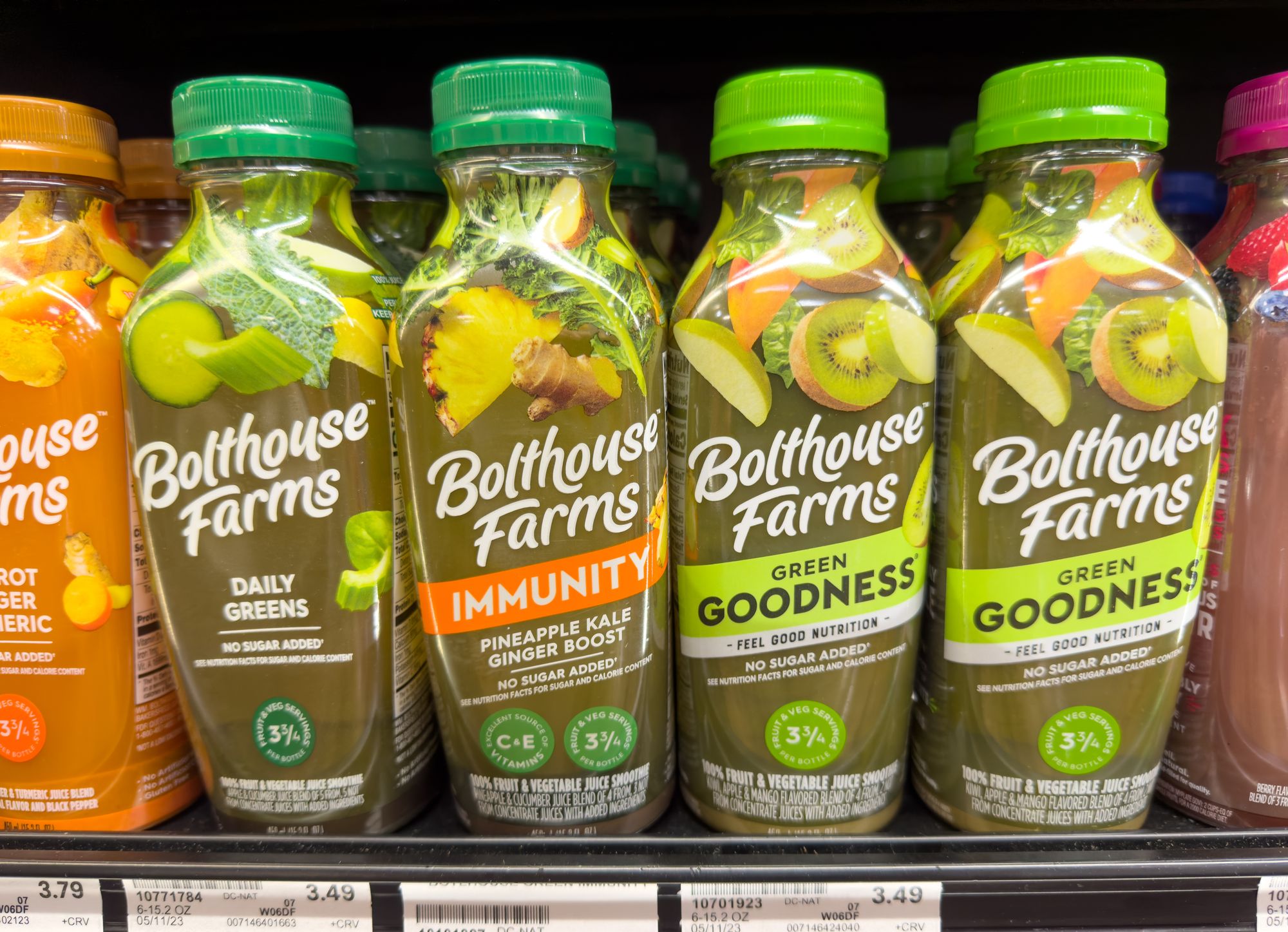
PER 15.2 FL OZ BOTTLE: 240 calories, 0.5 g fat (0 g saturated fat), 30 mg sodium, 56 g carbs (3 g fiber, 46 g sugar), 2 g protein
Although Bolthouse Farms' Green Goodness might appear to be a nutritious option due to its combination of spinach, kale, and spirulina, a more in-depth examination of its nutritional content reveals a notable concern," cautions Jessie Hulsey, RD, a dietitian based in Atlanta. "With a substantial 46 grams of total sugar, a mere 3 grams of fiber, and only 2 grams of protein per serving, this smoothie fails to deliver the well-rounded nutrition that individuals require. Excessive sugar consumption, combined with insufficient fiber and protein, can result in blood sugar spikes, suboptimal digestion, and a lack of satiety.
3) Welch's Fruit Punch
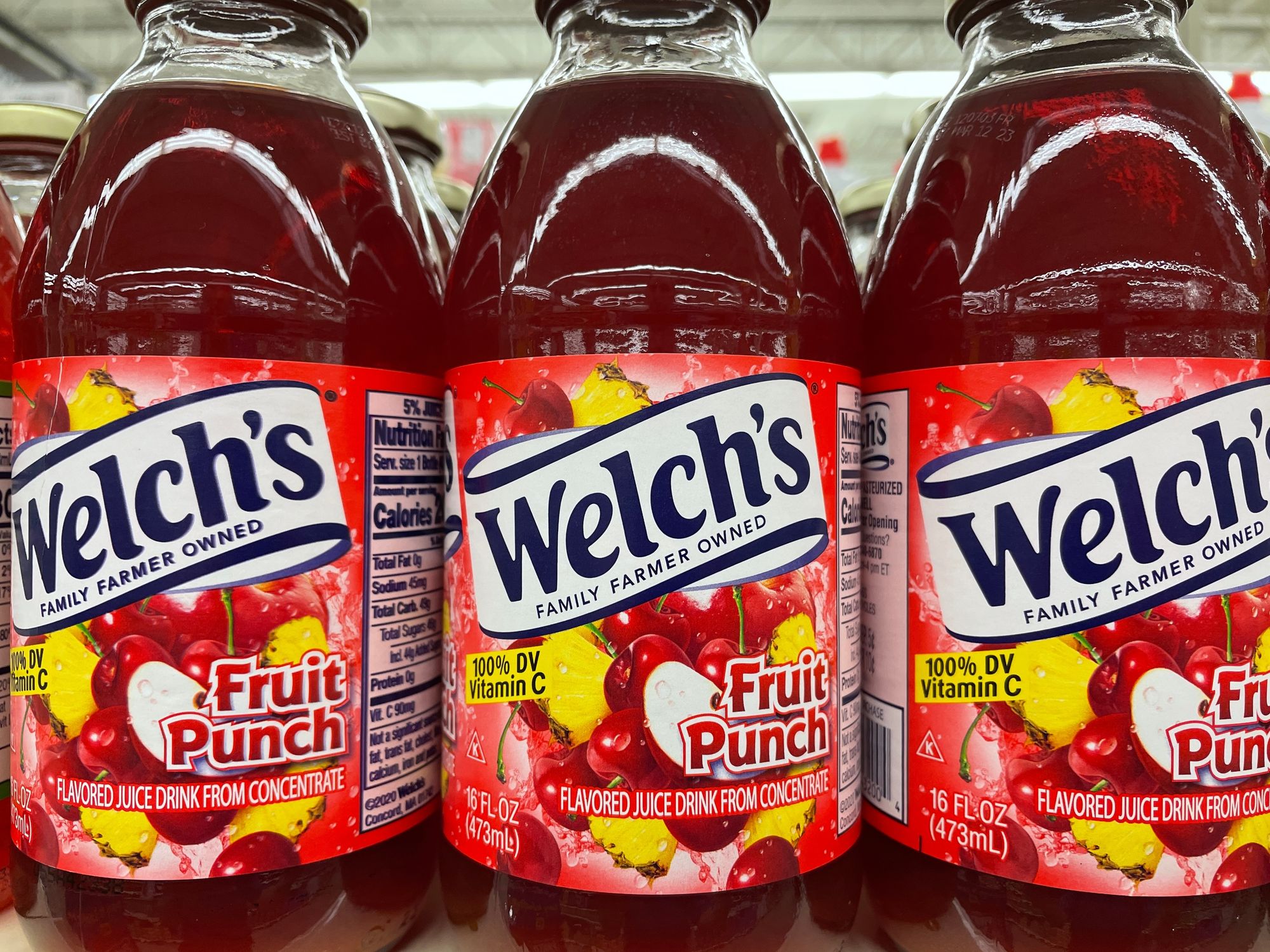
PER 8 FL OZ: 100 calories, 0 g fat, 25 mg sodium, 25 g carb (0 g fiber, 23 g sugar), 0 g protein
An 8-ounce portion of this juice provides roughly 50% of your daily recommended vitamin C intake. However, aside from that, this beverage offers minimal nutritional advantages and comes with several drawbacks.
"The primary two ingredients in Welch's Fruit Punch are water and high fructose corn syrup," notes Feder. "It's high in added sugars [22 out of the total 23 grams of sugar are added sugars], which can lead to undesirable weight gain and chronic illnesses with consistent consumption. Furthermore, it lacks various essential vitamins and minerals, providing negligible nutritional value."
Moreover, this product contains the zero-calorie sweetener sucralose, which certain studies suggest might disrupt the gut microbiome balance and potentially reduce insulin sensitivity.
4) Naked Blue Machine Juice
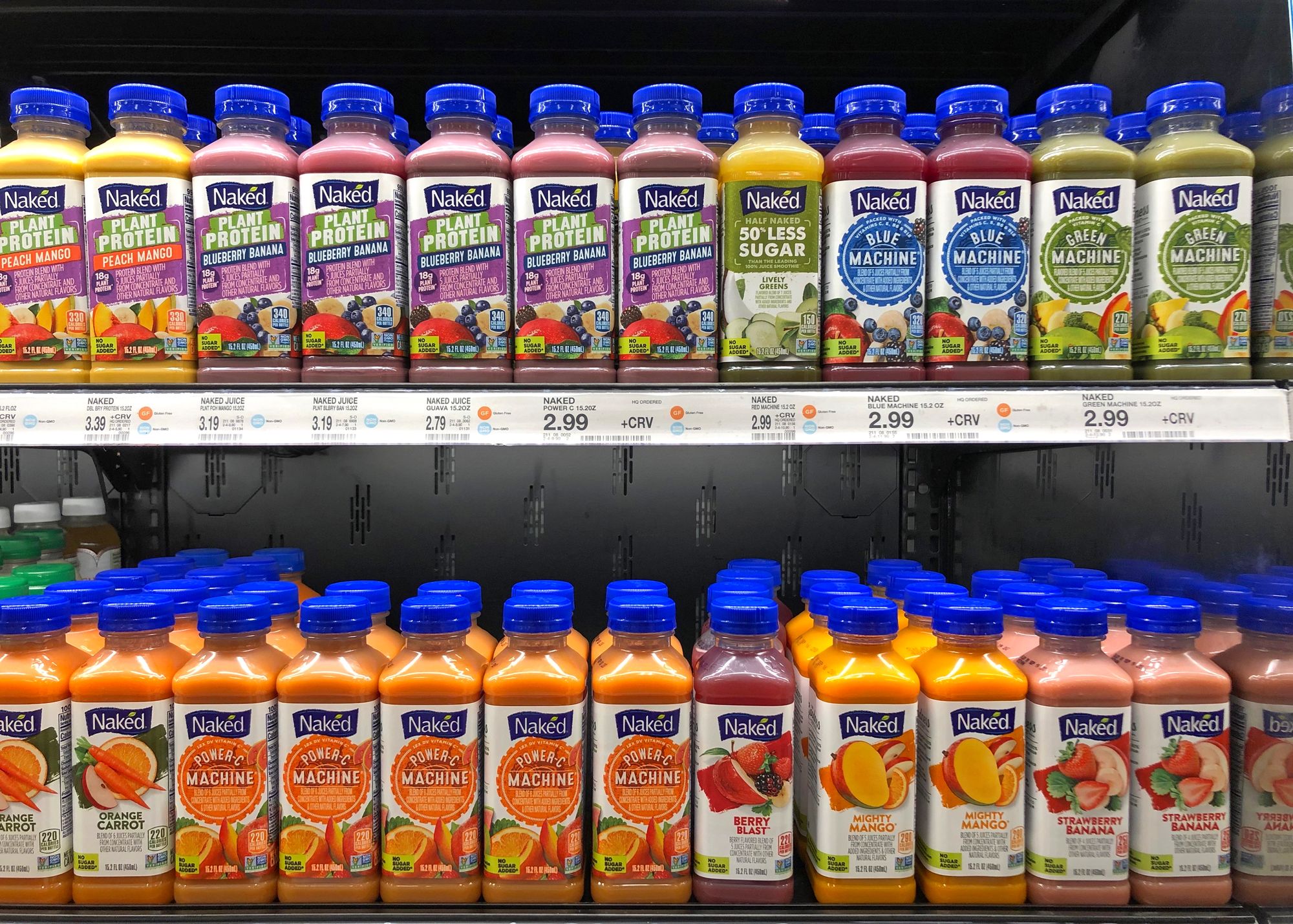
PER 15.2 FL OZ BOTTLE: 320 calories, 0 g fat, 20 mg sodium, 76 g carbs (3 g fiber, 55 g sugar), 2 g protein
When discussing the least healthy fruit juices, Patricia Kolesa, MS, RDN, singles out Naked Juice as a prime example. 'While many of them incorporate fruits and vegetables, certain varieties [such as the Blue Machine flavor] contain 50 grams of sugar or more,' notes Kolesa. 'This surpasses the sugar content of some sodas! Excessive added sugar consumption from beverages can lead to blood sugar spikes and 'sugar crashes,' resulting in low energy levels.'
For a more nutritious option, Kolesa offers the following advice: 'I would recommend making your own juice—or smoothie—at home or consuming whole fruits as frequently as possible!
5) PUR Cold Pressed Turmeric Lemonade
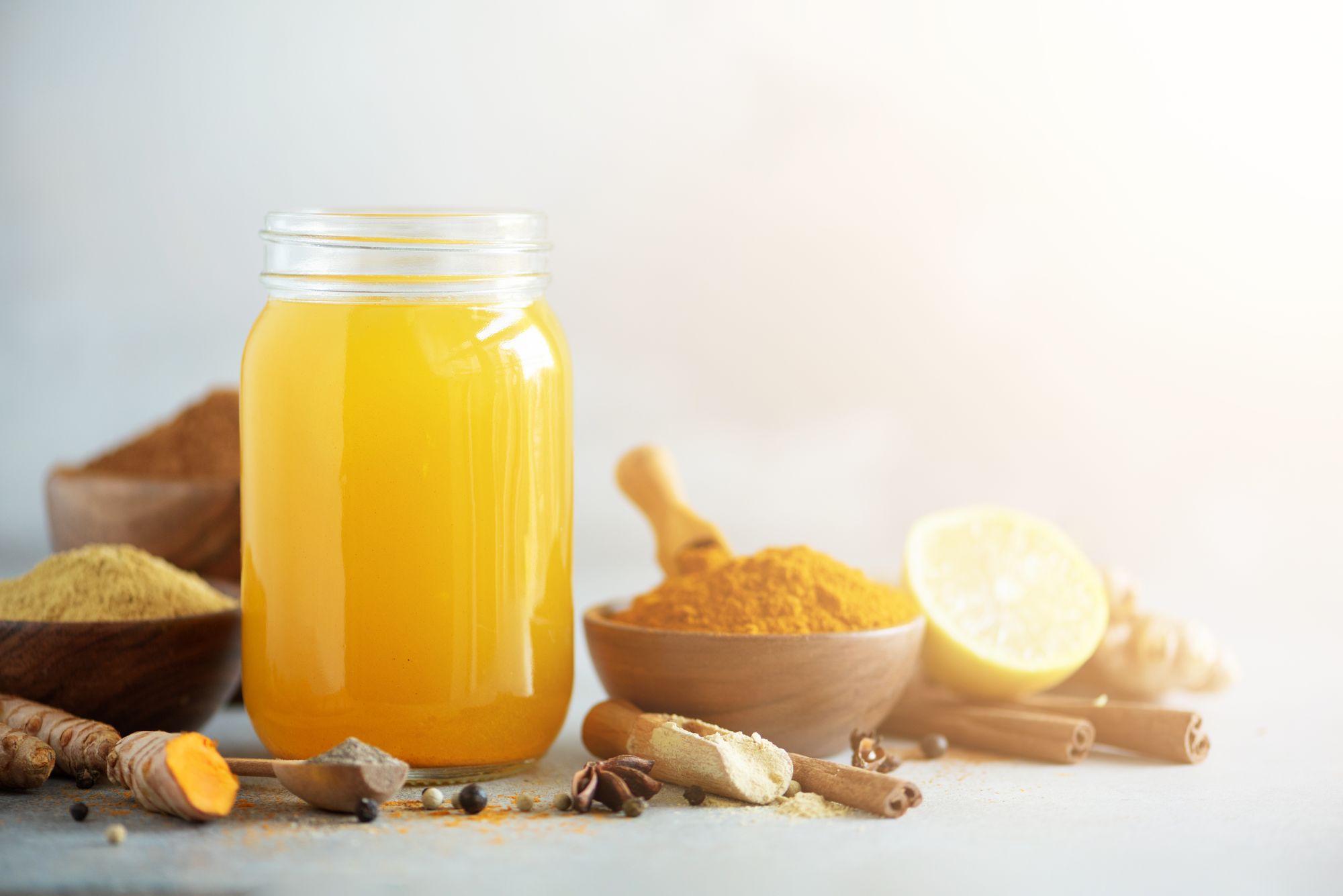
PER 16 FL OZ: 150 calories, 0 g fat, 0 mg sodium, 38 g carbs (0 g fiber, 32 g sugar), 1 g protein
Despite its name, the PUR Cold Pressed Turmeric Lemonade juice may give the impression of being a healthy option, boasting anti-inflammatory turmeric. However, with 30 grams of added sugar in a 16-ounce portion, it falls far from being an inflammation-reducing choice. Overconsumption of added sugar can elevate blood pressure, blood sugar levels, and triglycerides (a common type of fat in the blood), all of which are indicators of inflammation," cautions Sheri Berger, RDN, CDCES.
PUR offers a range of shot-sized juices that might provide a more favorable way to satisfy your preferences. These shots are packed with antioxidants and other micronutrients, delivering nutritional benefits in a concentrated serving size without the burden of added sugars.
6) Langers Mango Nectar
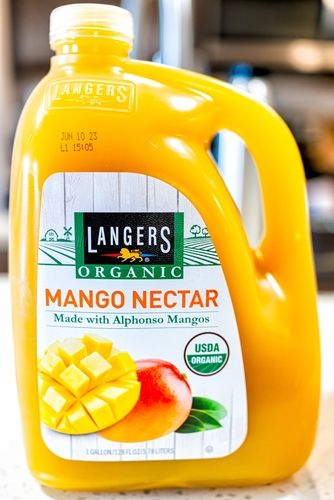
PER 8 FL OZ: 140 calories, 0 g fat, 15 mg sodium, 35 g carbs (0 g fiber, 33 g sugar), 0 g protein
Beyond steering clear of the previously mentioned health-related marketing claims, it's advisable to exercise caution with juices labeled as 'GMO-free' or those asserting 'no high fructose corn syrup,' as these claims can sometimes create a misleading impression of healthiness for specific juice products. Frequently, juice 'cocktails' can still be loaded with added sugars.
This scenario is evident in the case of Langers Mango Nectar Juice, which, despite its declaration of containing no high fructose corn syrup, still harbors 23 grams of added sugars per cup. This amounts to a staggering 46% of your recommended daily sugar intake for a relatively small beverage! Langers' ingredients are primarily comprised of filtered water, with minimal quantities of mango puree.
7) Ocean Spray Cranberry Juice Cocktail
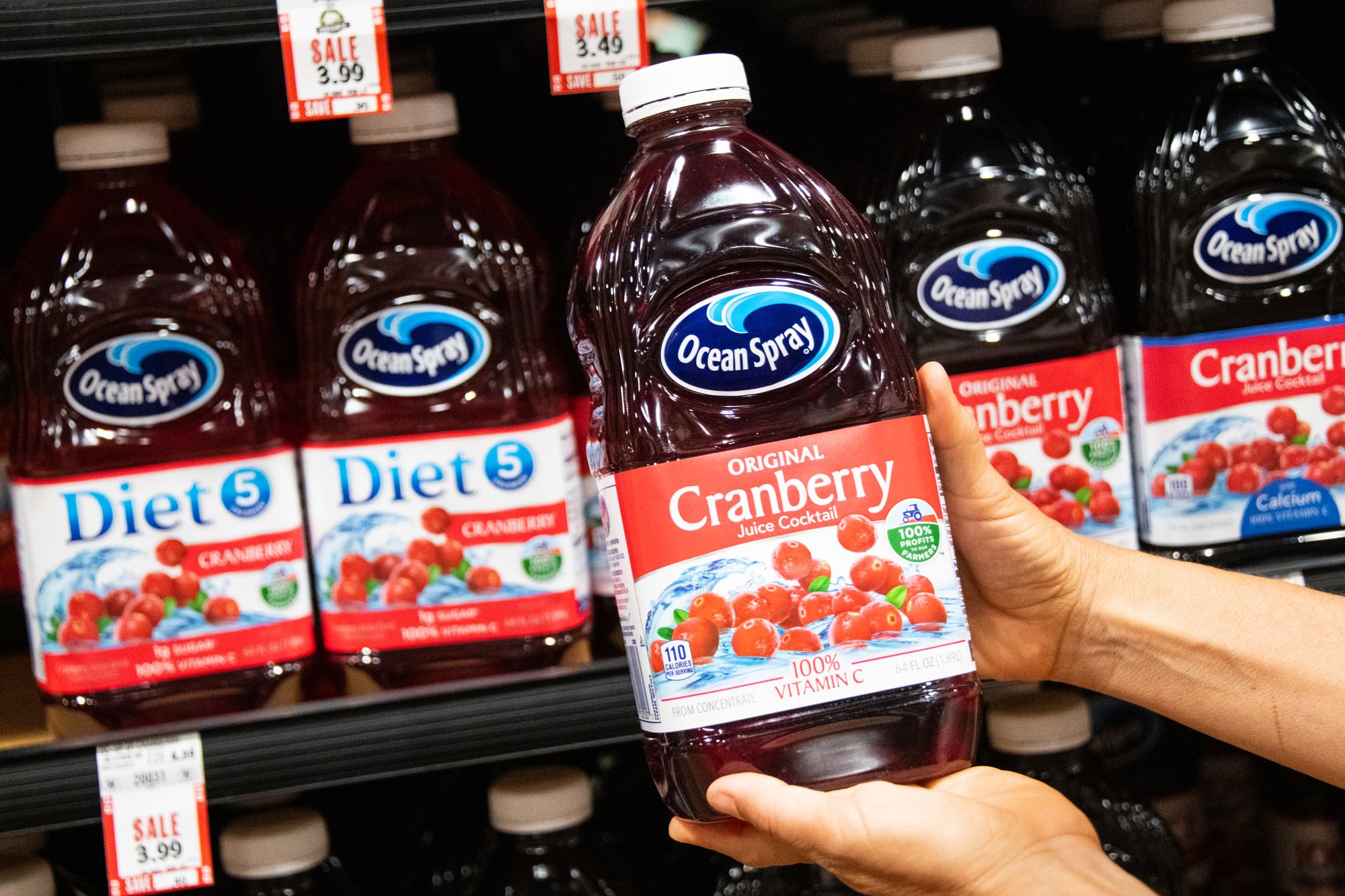
PER 8 FL OZ: 160 calories, 0 g fat, 5 mg sodium, 39 g carbs (0 g fiber, 9 g sugar), 0 g protein
Ocean Spray Pure Unsweetened Concord Grape Juice may give the impression of a reformulated, healthier version of their renowned grape juice," reveals Brittany Delaurentis, RD. "Nonetheless, one cup of this juice still contains 37 grams of sugar and 39 grams of carbohydrates. Opting for fresh grapes as a snack will consistently be a better choice.
9) Tropicana Caribbean Sunset
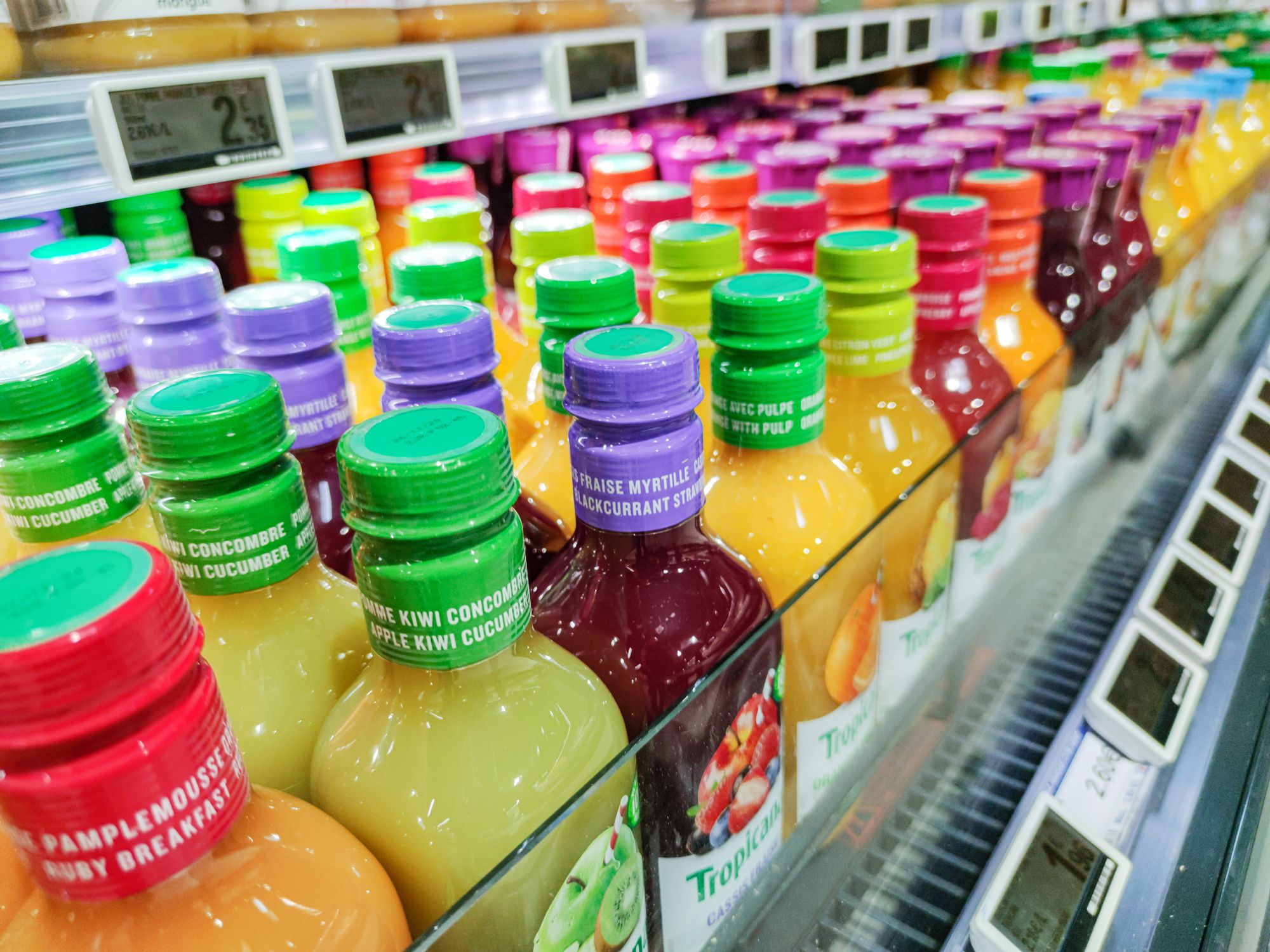
PER 8 FL OZ: 90 calories, 0 g fat, 5 mg sodium, 21 g carbs (0 g fiber, 21 g sugar), 0 g protein
"This juice offers minimal nutritional benefits," remarks Krutika Nanavati, MS, a Ph.D. candidate in the School of Sport, Exercise, and Nutrition and a licensed nutritionist with ClinicSpots. Tropicana Caribbean Sunset provides only approximately 10% of your daily recommended vitamin C intake, likely due to the predominant ingredients being water and sugar. Out of the substantial 21 grams of sugar in this beverage, 17 grams consist of added sugars.
This sugar content also equates to 21 grams of carbohydrates, which is roughly equivalent to the carbohydrate content found in two slices of whole wheat bread."
8)Ocean Spray Pure Unsweetened Concord Grape Juice
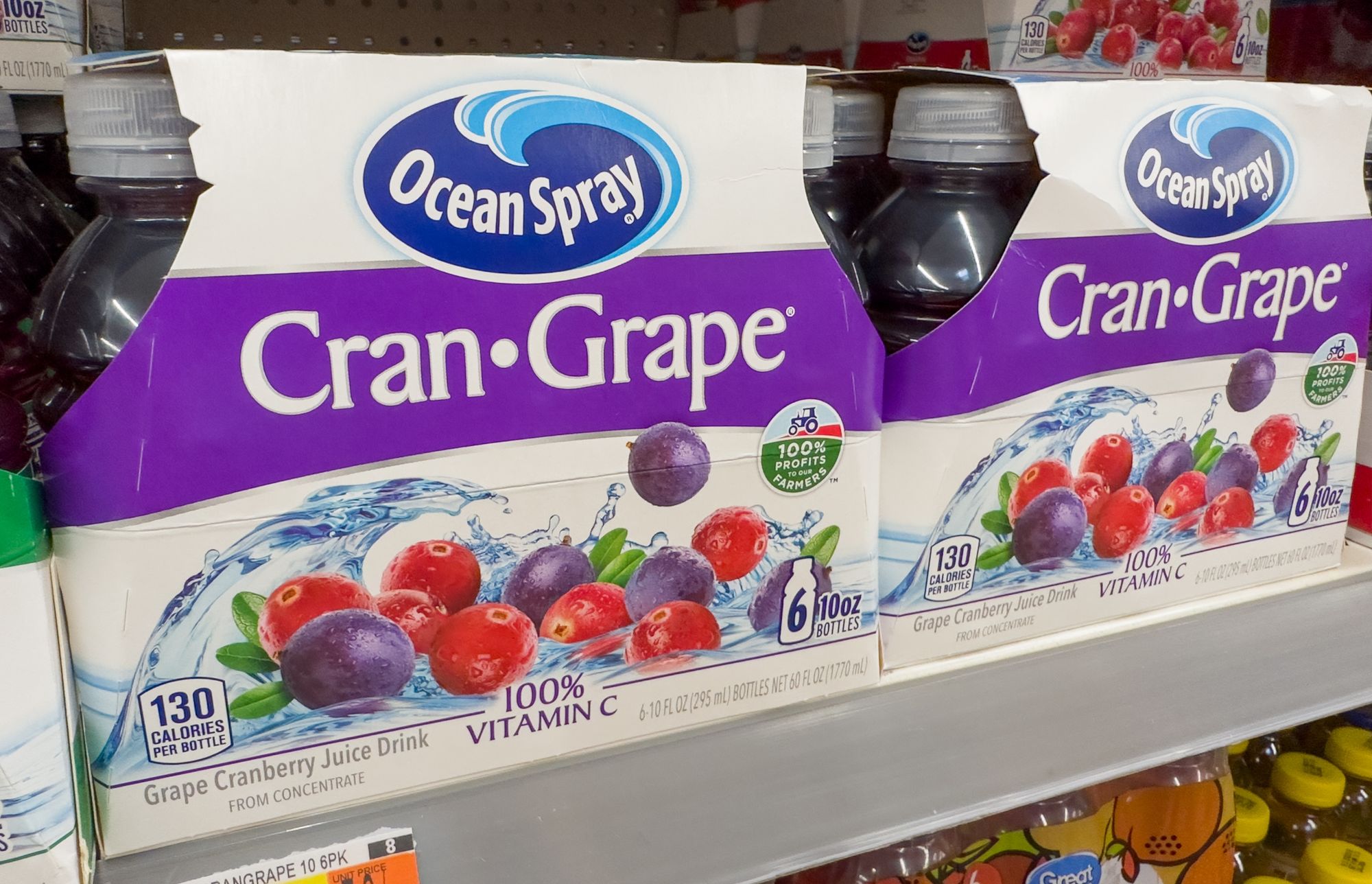
PER 8 FL OZ: 160 calories, 0 g fat, 5 mg sodium, 39 g carbs (0 g fiber, 9 g sugar), 0 g protein
Ocean Spray Pure Unsweetened Concord Grape Juice may suggest a reformulation aimed at enhancing its nutritional value," clarifies Brittany Delaurentis, RD. "Nevertheless, one cup of this juice still delivers 37 grams of sugar and 39 grams of carbohydrates. Opting for fresh grapes as a snack will consistently be the superior choice.

